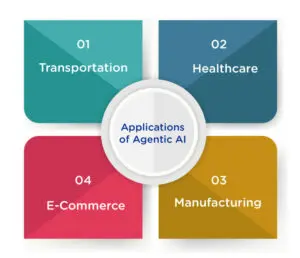The concept of Agentic AI is rapidly emerging as a transformative force in the tech world. Unlike traditional AI systems that function as tools for humans, agentic AI takes on a more autonomous role, capable of making decisions, adapting to new information, and taking actions independently. This innovation promises to reshape industries, but it also raises critical questions about control, accountability, and the ethical use of technology.
What Is Agentic AI?
The term “agentic AI” describes artificial intelligence systems with a high level of autonomy. These systems can sense their environment, analyze data, and make decisions without direct human input. The term “agentic” is derived from the word “agency,” highlighting the AI’s ability to act independently to achieve specific goals.
For instance, one of the best uses of agentic AI is in autonomous cars. These cars not only navigate roads but also react to unexpected situations, such as rerouting during traffic congestion or responding to sudden hazards. Similarly, in healthcare, agentic AI systems assist doctors by analyzing medical data and recommending personalized treatments, often faster and more accurately than human specialists.
Why Is Agentic AI a Game-Changer?
The emergence of agentic AI signifies a profound change in our perspective on technology. Instead of being mere tools, these systems act as collaborators capable of enhancing human productivity and innovation. Here are some key reasons why agentic AI is revolutionizing the tech landscape:
Efficiency and Speed
Agentic AI systems excel at processing large volumes of data quickly, enabling faster decision-making. In industries like finance, these systems monitor market trends in real time, executing trades or flagging risks with unparalleled speed.
Adaptability
Unlike traditional AI, agentic AI learns and adapts on the go. This flexibility allows it to operate effectively in dynamic environments, from managing supply chain logistics to optimizing energy usage in smart grids.
Reduced Human Intervention
Agentic AI eliminates the requirement for continual human supervision by functioning independently. This enables professionals to focus on strategic tasks while leaving repetitive or complex decision-making to AI.
Applications of Agentic AI Across Industries
The potential applications of Agentic AI span multiple sectors, driving innovation and efficiency in unprecedented ways:
Transportation
One of the most prominent applications of agentic AI is autonomous cars. These vehicles use sensors, cameras, and AI algorithms to make split-second decisions, ensuring passenger safety and efficient navigation.
Healthcare
Through the analysis of patient data and medical imagery, agentic AI improves diagnostic accuracy. It can recommend treatments tailored to individual needs, reducing errors and improving patient outcomes.
E-Commerce
In online retail, agentic AI personalizes shopping experiences by predicting customer preferences and automating inventory management. It also powers chatbots that resolve customer queries without human assistance.
Manufacturing
Smart factories leverage agentic AI to monitor equipment, predict maintenance needs, and optimize production schedules, reducing downtime and improving productivity.
Challenges of Agentic AI
While the benefits of agentic AI are undeniable, its rise comes with challenges that need careful consideration:
Accountability
It becomes difficult to determine culpability when autonomous systems make judgments. If an agentic AI system is harmful, who is at fault—the AI itself, the developers, or the operators?
Ethical Concerns
Agentic AI systems must operate within ethical boundaries. For example, in military applications, questions about AI’s decision-making in combat scenarios spark significant debate.
Data Privacy
Autonomous AI relies heavily on data. Preserving public confidence in agentic AI systems depends on protecting the privacy and security of this data.
How to Build Trust in Agentic AI
For Agentic AI to succeed, transparency and accountability must remain priorities. The following guidelines should be followed by developers and organizations:
Explainable AI: Make the decision-making processes of agentic AI understandable to users and stakeholders.
Ethical Guidelines: Establish frameworks that guide the development and deployment of autonomous AI systems responsibly.
Collaboration: Engage with policymakers, ethicists, and technologists to create standards that ensure fairness and accountability.
The Future of Agentic AI
Agentic AI could revolutionize human-machine cooperation as it develops further. By acting autonomously, these systems can solve complex problems and unlock new possibilities in technology and beyond. However, their success depends on how well we address the challenges they bring and ensure they operate in service of humanity.
Conclusion
The journey to fully embracing agentic AI will require innovation, regulation, and a commitment to ethical principles. When used responsibly, agentic AI can become a powerful ally in shaping a smarter, more efficient, and equitable future.
Recommended For You:


